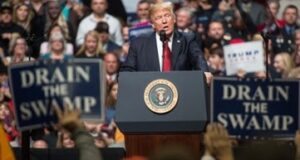
Public choice is often called by the shorthand “politics without romance.” In the Concise Encyclopedia of Economics entry, we summarize this romance to overcome as,
The wishful thinking…that participants in the political sphere aspire to promote the common good. In the conventional “public interest” view, public officials are portrayed as benevolent “public servants” who faithfully carry out the “will of the people.” In tending to the public’s business, voters, politicians, and policymakers are supposed somehow to rise above their own parochial concerns.
Public choice helps explain why, instead of selfless, elevated public servants pursuing only the public good, we see problems like log-rolling, rent seeking, and the concentration of power.
But there is another kind of romantic politics—one to which fans of public choice are much more susceptible. It’s the romantic notion that we can, in response to the problems with politics revealed by public choice, do away with politics altogether.
The theory is that if we can set the institutions and incentives, we can take the reins of politics off those areas of life. There are two problems with this theory. First, we don’t get to start from scratch, but from the world we’re in. That means the problems of public choice apply to the process that would have to bring about these changes. The second is related: it ignores that people do things through politics in the first place for a reason.
We’re stuck with each other.
Adam Smith got this. One of his most famous phrases is about the “man of system.” The man of system “seems to imagine that he can arrange the different members of a great society with as much ease as the hand arranges the different pieces upon a chess-board. He does not consider that the pieces upon the chess-board have no other principle of motion besides that which the hand impresses upon them”.(TMS VI.ii.2.17)
Market liberals often use this quotation to illustrate the flawed idea at the heart of comprehensive economic planning. But that’s not what Smith was talking about. Smith was talking about political change.
For example, Smith didn’t think that completely free trade was politically possible. It could only ever be brought about by a man of system. [1] Only a man of system could sweep aside political interests and organizations that would stand in the way of free trade. Only a man of system would try to order what remained to make that change last.
Instead, Smith acknowledges the importance of existing political structures, interests, and groups. Someone “whose public spirit is prompted altogether by humanity and beneficence” has to compromise and act politically. “He will accommodate, as well as he can, his public arrangements to the confirmed habits and prejudices of the people; and will remedy, as well as he can, the inconveniencies which may flow from the want of those regulations which the people are averse to submit to. When he cannot establish the right, he will not disdain to ameliorate the wrong; but like Solon, when he cannot establish the best system of laws, he will try to establish the best that the people can bear.” (TMS VI.ii.2.16)
Like it or not, some principles of motion are political.
Exchange and change
James Buchanan, who coined the term “politics without romance,” thought that modelling politicians and bureaucrats as economic actors is “not enough. If you start thinking about politics that way then you have a very empty type of theory…The thing that must be added to that must be the notion that at some ultimate level, people must enter into political arrangements for mutual gain.” (Buchanan Intellectual Portrait Series, 8:50)
The implicit hope for limits on politics that will solve the problems of politics is that the small-government policies frustrated by democratic politics can be imposed, one time, some other way. Then, things will simply run themselves. The new rules will become the background conditions for ordering society.
Over-emphasis of emergent institutions might be partially to blame for the temptation to treat institutions as background conditions that can be taken for granted. In reality, institutions and rules are also in the realm of politics. Institutions that can be improved don’t automatically fade into the background. They can also be changed back, or made worse from the status quo.
Those who want to depoliticize society hope for a lasting restriction on government action. There are two ways that action can be restricted. The first is to prohibit politics from breaking out again. This requires concentrating the power to set the limits on politics into some institutions not subject to democratic pressure. The libertarian warning that we shouldn’t create power we wouldn’t hand to our political opponents comes to mind.
The second way toward lasting change is to do the persuasive work that would have brought them about—or the best approximation that the people can bear—through democratic politics. This method does not save anyone from the problems in politics that public choice so usefully identifies. But unlike a solution that prevents politics from breaking out, democratic persuasion keeps power dispersed and treats people as equals, with principles of motion of their own.
It’s not as neat and tidy. It’s not as romantic. But it’s democratic. It’s liberal. That should be enough.
[1] Thanks to Jacob T. Levy for this observation.
[2] Thanks to Mike Munger for making me aware of this quotation.
[3] In the interview, Buchanan rejects the view that any single theory, even public choice, explains politics.




